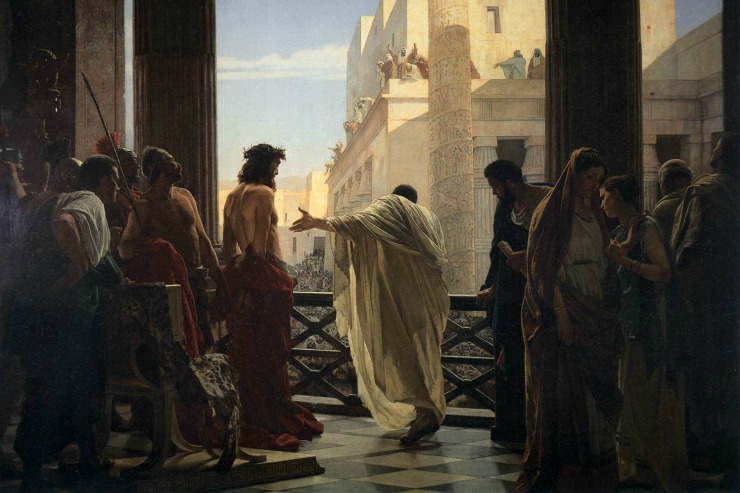Shall I Crucify Your King?
by Joannie Watson | April 7, 2017 12:04 am

“Ecce Homo” by Antonio Ciseri
As we approach Palm Sunday and Good Friday, we also approach one of the most difficult moments in liturgy: our call to crucify Christ. For the reading of the Passion accounts in these liturgies, there is the option for the Gospel to be read by multiple readers. I would venture to guess that most parishes read the Passion account this way. Thus, it falls to us in the pews to utter those difficult words: Crucify him.
I recently gave a talk on the Catholic Church and the Holocaust. While it was mostly focused on Pope Pius XII and the efforts of the Vatican, I closed with a reminder to examine our own willingness to stand up in the face of evil. Ultimately, the Church is not the Pope or the hierarchy. We are the Church. And while we can point fingers or hash out whether the Church did enough during the Holocaust, we ultimately have to face the question: What would I have done? At the end of our lives, we are not going to answer for what a Pope did or did not do, or what our parish priest did or did not do in his life. We will answer for what we did.
This is what we are reminded during the Palm Sunday liturgy. We raise our voices as a Church to cry, “Let him be crucified!” Ultimately, it was not Pilate who killed Jesus. It was our sins that crucified Our Lord.
A story is often told about G.K. Chesterton (one of those “if it’s not true, it should be” stories) that when a newspaper asked for essayists to respond to the question, “What’s wrong with the world?” Chesterton famously answered with two words: I am.
We can create a laundry list of concerns and complaints against our modern culture, point fingers and find scapegoats. But are we looking past our own sins – both of omission and commission? I can do little to change the government, to change the media, to change the tide of the current culture. I can do a lot to change my own life, to change the way I treat those around me, to change my attitude towards my family and friends and enemies. I can love more. I can resist giving into sins. I can pray more.
When we raise our voices this weekend to cry “Let him be crucified,” may it not just be like reciting lines of a play, or said distractedly or inattentively with our hearts and minds elsewhere. Rather, may the words pierce our hearts and remind us of the role we played. May they help us call to mind our sins. Most of all, may they spur us to seek His mercy.
The drama of the Palm Sunday liturgy not only calls us to face the effect of our sins, it also reminds us that those sins have a Savior. Just when we see the horror of sin, in all its manifestations, we also see that our sins will not be the final answer.
“It is precisely in the Passion, when the mercy of Christ is about to vanquish it, that sin most clearly manifests its violence and its many forms: unbelief, murderous hatred, shunning and mockery by the leaders and the people, Pilate’s cowardice and the cruelty of the soldiers, Judas’ betrayal – so bitter to Jesus, Peter’s denial and the disciples’ flight. However, at the very hour of darkness, the hour of the prince of this world, the sacrifice of Christ secretly becomes the source from which the forgiveness of our sins will pour forth inexhaustibly.” (CCC 1851)
“May his blood be upon us and upon our children,” because by his wounds we are healed.
 [1]Please share on social media.
[1]Please share on social media.
- [Image]: http://www.integratedcatholiclife.org/donate/
Source URL: https://integratedcatholiclife.org/2017/04/watson-shall-i-crucify-your-king/